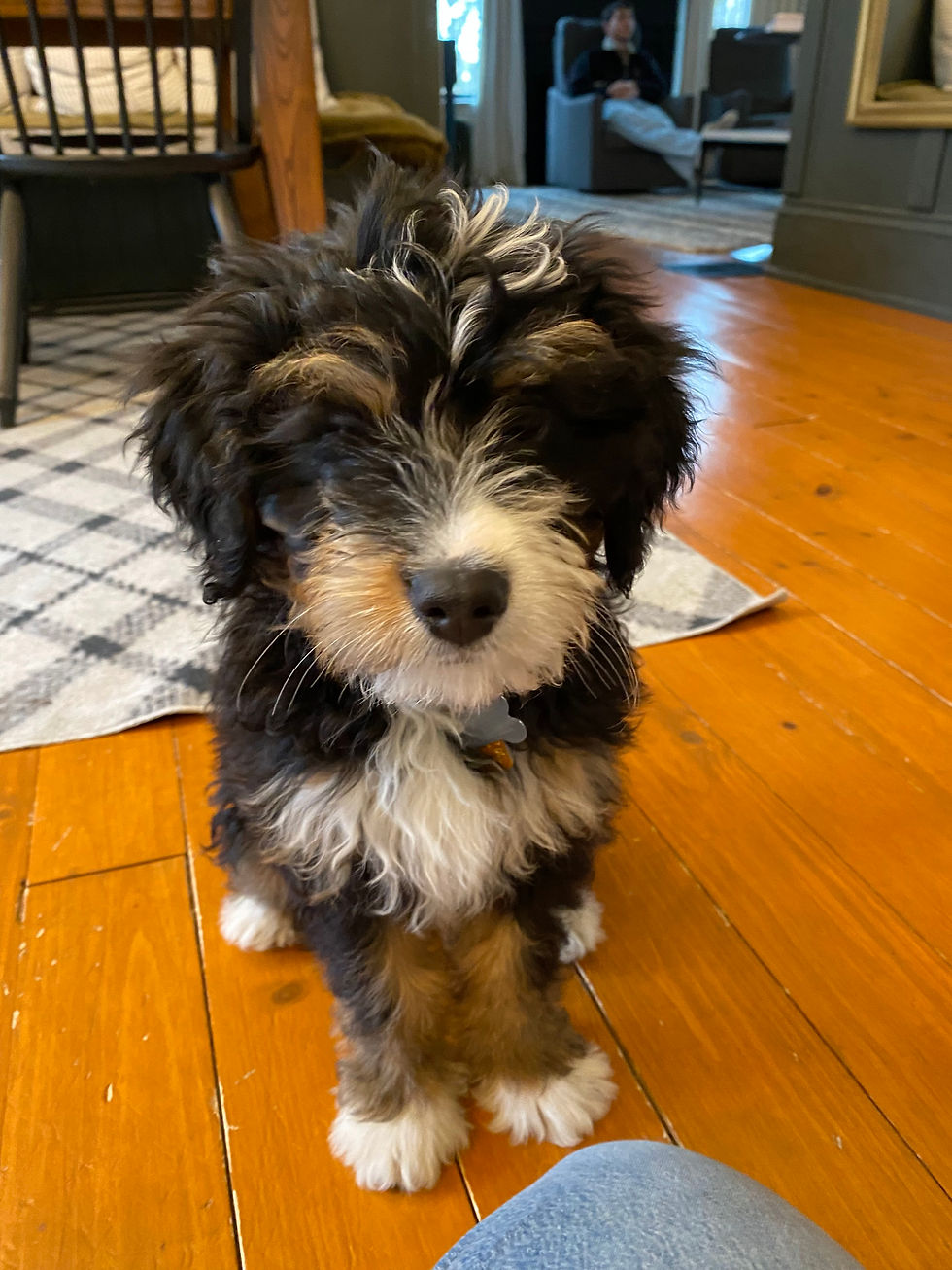Living the Puppy Life: Unexpected Joys and Challenges You'll Face
- woodbriaramds
- Jun 6, 2025
- 5 min read
Bringing a puppy into your life is like stepping into a world full of excitement and love, mixed with some surprises along the way. The joy of those tiny paws padding through your home can illuminate even the dullest days. However, just as happiness comes, there are challenges that accompany puppy life. Let’s explore both the happy/fun and the more difficult aspects of sharing your life with a puppy.
The Joy of Unconditional Love
Nothing beats the unconditional love a puppy brings into your home. From the moment they arrive, they shower you with endless affection. The little things, like a wagging tail or those big, innocent eyes, have a magical way of transforming any tough day into one filled with warmth.
Consider this: studies show that petting your dog can release oxytocin, the “love hormone,” in your brain, promoting feelings of happiness. Simply being close to your puppy—a cuddle on the couch or an enthusiastic greeting at the door—can lift your spirits and create a bond of loyalty unlike any other.
The Playful Spirit
Puppies come with an endless store of energy, and their playfulness is a source of joy. Watching them tumble, chase toys, or discover their own reflections often resembles a hilarious cartoon. According to a survey, 75% of puppy owners report that their dogs become the best stress relievers, encouraging play and fun that lifts their mood.
This spirited nature inspires you to get moving. You might find yourself taking longer walks, playing fetch in the yard, or even participating in puppy obedience classes. These activities help strengthen your connection, making every moment an opportunity for laughter and love.
The Training Journey
With all that playfulness comes the essential task of training your puppy. Puppies aren’t born knowing the rules. House training, learning commands, and socializing with people and other dogs all require time and commitment. Although the training journey can feel daunting, with consistency, you will see progress.
For example, you may find that your puppy learns to “sit” in just a few days with short daily sessions. Tracking small wins can stimulate your patience—like celebrating the moment they learn each new command and knowing that with regular practice they are commands they'll know for the rest of their lives. Each small victory is a step toward building a well-behaved companion.
The Early Morning Wake-ups
As charming as they are, puppies do not have a snooze button. Early morning wake-ups are part of life with a puppy. You might experience wake-up calls at 5 AM that involve whining or boundless energy, leading to disruptions in your sleep. But, you really can teach your puppy to wait in their crate quietly until you're ready to get them out. To begin, when your puppy starts whining, crying, or even barking in their crate, try waiting for quiet for at least 2-3 minutes. Once they're quiet, then walk up to their crate only if they're sitting and quiet. If they begin to bark or jump around, then just stop and wait for still and quiet. I will even quietly say "nope" and wait. Never reward a puppy when they're overly excited, this will only teach them that barking and jumping is what gets them what they want. Once they're sitting and quiet, slowly open the crate door. If they bounce forward to get out of the crate, gently close the door and say "nope". Wait again for sitting and quiet, then carefully open the crate door again - slowly. This may take a few times of repetition, and at this point I'm sure your puppy really needs to potty, so you can gently place your hand on them as you open the crate and pick them up right away to head outside. Over the next few hours and days, you can continue working on teaching them that they are to wait in their crate quietly while you open the crate door, and not until you release them to come out should they step out of the crate. I know, it seems like a lofty plan, but it really is possible and even probable that with consistency your puppy will learn to be calm and patient, and even let you sleep in on those lazy weekend mornings. Keeping mornings dull also helps. Other than taking them out to do their business, mornings should remain fairly boring. Don't feed them right away, run around and play first thing in the morning, or give an overabundance of attention right out of the gate in the morning. Basically, go about your daily routine, get ready for your day, let your puppy hang out in their playpen and watch you do your thing, and then after awhile you can tend to their needs. This helps to avoid them being impatient to be let out of their crate in the mornings. Believe me, they'll be just fine and it will go a long way to prepare them for a calm, relaxed future.
The Messy Mishaps
Let’s face it: welcoming a puppy means embracing a new level of chaos. From chewed slippers to scattered kibble, your home may undergo a whirlwind of mess in those early months. You can significantly cut down on the overall craziness of a new puppy, though by limiting their access to your whole home until they have fully become dependable and reliant. This will happen, I promise.
However, remember that these incidents reflect your puppy’s natural curiosity and energy. Keeping cleaning supplies handy will help, and investing in a high-quality vacuum can make disasters easier to handle. Patience is key. Eventually, you’ll establish a rhythm, making it possible to share your space harmoniously.
This cleaning spray is a must-have for new puppy parents, as well as this amazing spot cleaner that I have used more times than I'd like to admit, and love. It's specifically designed for puppy accidents and puppy hair, it's amazing!
SOCIALIZATION 101
Socializing your puppy is critical for their development. Exposure to various people, environments, and experiences builds a confident, well-rounded dog. However, going out into the world can be intimidating for both you and your puppy, especially if they are a bit shy.
Start with short, positive outings to places such as local parks or the homes of dog-friendly friends. For instance, taking your puppy to a pet shop can provide enriching experiences that encourage curiosity, which further helps ease their social anxieties.
The Health Considerations
Owning a puppy means being proactive about their health. Regular vet visits, vaccinations, and treatments for parasites should quickly become part of your routine. Puppies are vulnerable to various health issues, so understanding their needs is vital.
Finding a local vet that you connect with and trust goes a long way to preparing and educating you about all the in's and out's of raising a happy, healthy puppy.
The Lifelong Commitment
Ultimately, owning a puppy is a significant commitment that lasts years. Before bringing a puppy home, consider how they will fit into your life. Daily care, love, and attention are non-negotiables.
Reflect on the stability you can offer and whether you can maintain a routine that supports your puppy’s needs. Despite the challenges, the love and loyalty you gain will be invaluable. Watching your puppy develop into a loving adult dog is a rewarding journey that deepens your bond.
Embracing the Journey
Life with a puppy is a whirlwind of experiences, filled with laughter and challenges. Each moment shapes both you and your furry companion. You will find patience in stressful situations and joy in playful interactions.
Approaching each challenge with an open heart and humor will guide you through the delightful chaos. Life with a puppy is an unforgettable adventure overflowing with tail wags, slobbery kisses, and precious memories. Get ready to enjoy every part of this beautiful journey!



Comments